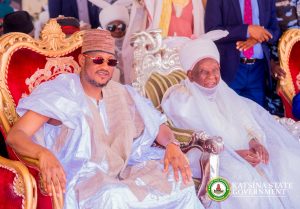Springboks captain Kolisi gets his chance to make history


TOKYO (AP) — It was the week after Siya Kolisi’s fourth birthday in 1995 when Nelson Mandela presented Springboks captain Francois Pienaar with the Webb Ellis Cup in a defining moment for rugby, and for South Africa.
Kolisi was 16 when the Springboks won their second Rugby World Cup title. There was no television at his home, he recalls, so he had to go to a tavern to watch John Smit lift the trophy after beating England in the 2007 final in Paris.
“I know what it did for us back then,” he said. “I have never seen people come together (like that) over sport.”
Twelve years on, the first black player appointed as Springboks captain gets a chance to etch his name in history on Saturday when he leads South Africa in the final against England a Yokohama.
He wants to experience that feeling of cohesion again.
Mandela, who’d become president in 1994 in a democratic election after decades of racial segregation and his own imprisonment for 27 years, was pivotal in ensuring the Springboks kept their name, their emblem and their green jersey in the wake of the apartheid era, hoping it could help unite a deeply divided country rather than be a symbol of oppression.
It certainly hasn’t hurt. Joining Kolisi in the starting forward pack — the engine room of the Springboks game plan — will be two black front-rowers: 34-year-old prop Tendai Mtawarira and hooker Mbongeni Mbonambi.
In a team that prides itself on its scrum, Mtawarira has been a trailblazer, already having started 101 tests at prop and appearing in 116 for South Africa. He takes great pride in Kolisi’s ascent to the captaincy, and in the player as a man unto himself.
“What Siya has achieved has been remarkable. For a young kid from Zwide township in Port Elizabeth to rise above his circumstances and become Springbok captain, and lead the way he has, it’s been inspirational to all South Africans — from all walks of life,” Mtawarira said. “The way South Africa has gotten behind him, it means a lot to unite the country. He’s been exemplary, so it’d be amazing to win this World Cup with him as captain.”
Kolisi was elevated to the Springboks captaincy in June last year, and has been a driving force in the resurgence of the national team under the direction of Rassie Erasmus, a former Springboks flanker who also got to lead his country and who has an eye for game-changing talent.
Injuries curtailed Kolisi’s season as South Africa won the 2019 Rugby Championship, the pinnacle of the southern hemisphere’s competitions, but he returned to take his place at the helm of the World Cup squad which has united under the banner of “stronger together.”
The final will be his 50th test match, and obviously his teammates want to ensure it’s a golden jubilee.
“A lot has gone into the preparation, and the road Siya has walked to get to here has been inspirational already,” Mtawarira said. “For that to be sealed off with winning the World Cup would be amazing.”
Try-scoring winger Chester Williams, who died in September, was the only person of color in that Springboks XV that won in ’95, under the “One Team, One Country” banner.
The influx of players post-apartheid and an overhaul of selection policies has enhanced the racial composition of the squad, to the point where Mtawarira and Kolisi talk about the importance of it representing the 55 million people and 11 language groups.
“I’ve had the privilege to see the team evolve to get to now . so many guys of color who have been excellent and are deserving of their places in the squad,” Mtawarira said. “It is something Rassie was honest about, that we need to get the balance correct and we need to get a team that really represents our country.”
Kolisi was a replacement in two games in the 2015 World Cup but has started in all the major games this time. His bond with Erasmus goes back a decade, when the now Boks coach gave Kolisi his first professional contract. Erasmus said there wasn’t a lot of conversations or buildup to Kolisi’s appointment. He simply was the best-performing captain of a South African franchise in Super Rugby, and first choice as leader.
Kolisi took a call from President Cyril Ramaphosa before last weekend’s 19-16 semifinal win over Wales, extending good luck wishes from all of South Africa.
“It is really special to see how they have bought into what we are doing here,” Kolisi said.
Ramaphosa will be at the final on Saturday, along with Kolisi’s father — who is flying internationally for the first time — and his father-in-law.
Each progressive step through the tournament, from the group stage to the quarterfinal win over host Japan to the semifinal win, Kolisi has stuck to a theme of the team bringing something special to all South Africans.
“Yes, we do have many different races in our country, and 11 different languages. It is one of the positives of our country. I think it’s really beautiful (and) that’s why we are called the ‘Rainbow Nation,’” he said. “For us, winning is very important for our country. It just shows that when we decide to work together for one goal or as a team and as a country, we can make anything happen, and achieve all the goals and dreams.
“I’ve seen what it has done for the country before — I was old enough to remember the 2007 World Cup — and I know what it would do now.”







